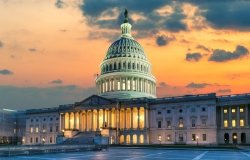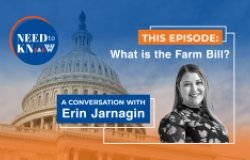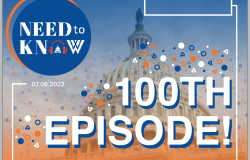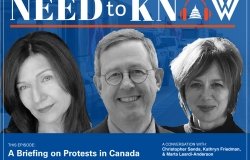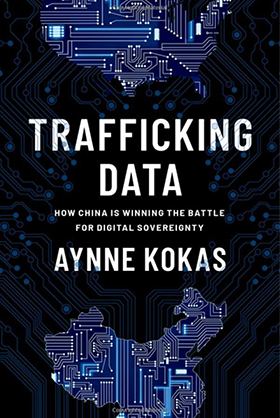Immigration & Public Opinion: What's the Climate for Change?
Rep. Zoe Lofgren, (D-Calif.); Rep. Dan Lungren, (R-Calif.); H. Richard Friman, Professor of Political Science, Dept. of Political Science, Marquette University; Scott Keeter, Director of Survey Research, The Pew Research Center
Overview
Rep. Zoe Lofgren, (D-Calif.); Rep. Dan Lungren, (R-Calif.); H. Richard Friman, Professor of Political Science, Dept. of Political Science, Marquette University; Scott Keeter, Director of Survey Research, The Pew Research Center
Two members of the House Judiciary Committee's Subcommittee on Immigration disagreed on whether Congress could enact an immigration reform bill next year. Rep. Zoe Lofgren (D-Calif.), chair of the Immigration Subcommittee, thinks the climate's right for passing a comprehensive reform bill with the Obama administration and public opinion behind it. Rep. Dan Lungren (R-Calif.) said the public mood is not favorable to tackling the issue given the state of the economy, high unemployment and anger over big government and deficits.
Lofgren cited polling data showing strong support for resolving the issue. "I was at the White House meeting last June along with over two dozen of my colleagues when President Obama made clear he was fully committed to passing comprehensive immigration reform legislation this year," she noted. While that goal has slipped some given the health care debate, she said, Secretary of Homeland Security Janet Napolitano, the president's point person on the issue, has been working closely with the leaders and committees in Congress to ensure we can move on this early next year. "The American people are tired of inaction on this," she went on. "Doing nothing is not an acceptable alternative. My goal is to come up with a sensible plan." While she conceded that "the people who are against this are really against it—a very loud and active minority," Congress should follow the wishes of the majority who want us to solve the problems of illegal immigration and border security.
 Lungren, who was first in Congress from 1979 through 1988, recalled the tough fight he was involved with in the mid-1980s in passing the Simpson-Mazzoli immigration bill (named after the lead proponents, Sen. Alan Simpson and Rep. Romano Mazzoli). "Not only did I have a difficult time persuading my Republican colleagues to vote for it," he noted, "but we had to convince the Reagan Administration to support it. I almost ran my car off the road when it came over the news that President Reagan had signed the bill." Lungren said he made a commitment to his colleagues at the time that it "would be the last time I would ask them to legalize the illegal immigrants already in the country (we didn't call it amnesty in those days). Now we are again asking to allow those in this country to register, pay fines and back taxes in order to remain in the country." Lungren said it would be wrong to link that process to "a path to citizenship" because that would be unfair to all those who have been waiting in line legally to gain citizenship. "Allowing some to cut in line in front of those who have been waiting offends everyone's sense of school yard fairness and would probably kill any bill's chances," he concluded.
Lungren, who was first in Congress from 1979 through 1988, recalled the tough fight he was involved with in the mid-1980s in passing the Simpson-Mazzoli immigration bill (named after the lead proponents, Sen. Alan Simpson and Rep. Romano Mazzoli). "Not only did I have a difficult time persuading my Republican colleagues to vote for it," he noted, "but we had to convince the Reagan Administration to support it. I almost ran my car off the road when it came over the news that President Reagan had signed the bill." Lungren said he made a commitment to his colleagues at the time that it "would be the last time I would ask them to legalize the illegal immigrants already in the country (we didn't call it amnesty in those days). Now we are again asking to allow those in this country to register, pay fines and back taxes in order to remain in the country." Lungren said it would be wrong to link that process to "a path to citizenship" because that would be unfair to all those who have been waiting in line legally to gain citizenship. "Allowing some to cut in line in front of those who have been waiting offends everyone's sense of school yard fairness and would probably kill any bill's chances," he concluded.
 Scott Keeter, director of survey research with the Pew Research Center, cited polling data similar to that mentioned by Lofgren showing public support for immigration reform, but cautioned that most people do not rank the issue of immigration high on their priority list of things that should be dealt with. He also noted that the intensity levels on the issue are not as great as they are on things like jobs, the economy and deficits.
Scott Keeter, director of survey research with the Pew Research Center, cited polling data similar to that mentioned by Lofgren showing public support for immigration reform, but cautioned that most people do not rank the issue of immigration high on their priority list of things that should be dealt with. He also noted that the intensity levels on the issue are not as great as they are on things like jobs, the economy and deficits.
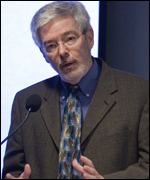 Professor H. Richard Friman of Marquette University summarized case studies he had conducted of the 1965 and 1986 immigration enactments and how party and committee leaders in Congress were able to frame the issue of immigrant criminality. The perception that immigrants account for a high number of crimes was something that had to be dealt with to avoid the harsh alternatives of excluding or deporting everyone. The leaders were able to counter this by focusing on tough enforcement for serious crimes and portraying illegal immigrants as "living in the shadows" in the U.S. and consequently "being victims of predators themselves."
Professor H. Richard Friman of Marquette University summarized case studies he had conducted of the 1965 and 1986 immigration enactments and how party and committee leaders in Congress were able to frame the issue of immigrant criminality. The perception that immigrants account for a high number of crimes was something that had to be dealt with to avoid the harsh alternatives of excluding or deporting everyone. The leaders were able to counter this by focusing on tough enforcement for serious crimes and portraying illegal immigrants as "living in the shadows" in the U.S. and consequently "being victims of predators themselves."
The panelists agreed that the 1986 Act was not successful in the long run because of lax enforcement. This time there will have to be much better verification procedures and severe penalties for employers who knowingly hire undocumented workers, the two Members said. But Lungren persisted in arguing the timing is not right to move on the issue with so many people out of work and independent voters already expressing disenchantment with the president and Congress over issues like the bailouts, cap-and-trade, and health bills.
By Don Wolfensberger Director, Congress Project
Documents & Downloads
- Immigration & Public Opinion: What's the Climate for Change?Download
- Immigration & Public Opinion: What's the Climate for Change?Download
- Immigration & Public Opinion: What's the Climate for Change?Download
- Immigration & Public Opinion: What's the Climate for Change?Download
- Immigration & Public Opinion: What's the Climate for Change?Download
Thank you for your interest in this event. Please send any feedback or questions to our Events staff.


